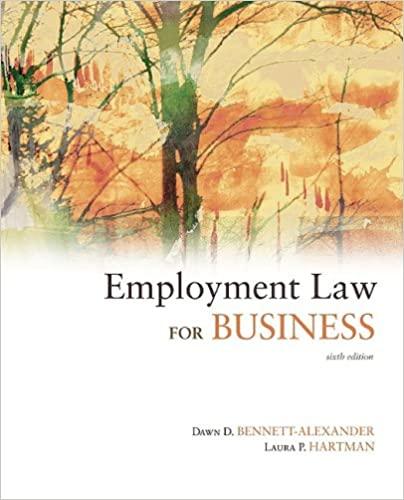Question
Scenario: Mrs. Hughes, a 39-year-old Jehovah's Witness, was admitted to the hospital to undergo a hysterectomy. At the time of her admission to the hospital,
Scenario:
Mrs. Hughes, a 39-year-old Jehovah's Witness, was admitted to the hospital to undergo a hysterectomy. At the time of her admission to the hospital, Mrs. Hughes signed forms expressing her desire not to receive any blood or blood products. She also verbally expressed this intention to her treating physician, Dr. Ances. Unanticipated problems arose during surgery that, in Dr Ances' opinion, required blood transfusions to save Mrs. Hughes' life. Dr. Ances contacted Mr. Hughes, Mrs. Hughes' husband, to discuss the emergency situation and his wife's need for blood. While on the phone, Mr. Hughes, also a Jehovah's Witness, authorized transfusions.
On May 14, 1 991 , the hospital initiated an emergency hearing before a judge for the purpose of having guardian appointed for Mrs. Hughes to allow additional transfusions after the surgery. She was unconscious and incapable of expressing her desires at the time.
Dr. Ances testified that Mrs. Hughes, who had been his patient for 6 weeks, told him she did not want blood products. He informed her that a time could arise when blood might be needed to save her life. He also told her that, given the procedure and the size of the uterus, it was unlikely that she would need blood during the surgery. Dr. Ances was aware that Mrs. Hughes had signed hospital forms refusing blood. Dr. Ances told the judge that he assumed Mrs. Hughes was aware of the ramifications of refusing the blood and therefore did not specifically discuss them with her. After hearing testimony from Dr. Ances and Mrs. Hughes' family, the judge found that the evidence was unclear as to whether she would want blood or blood products if it meant saving her life. As a result, the judge appointed the hospital's risk manager as temporary guardian for the limited purpose of giving consent to the administration of blood and blood products. The order explicitly extended only until Mrs. Hughes regained consciousness and became competent to make her own decisions.
Did the Court err in appointing a medical guardian?
Why or why not?
Were ethics placed above the patient's rights and wants?
Why or why not?
What is the role of the Court?
Step by Step Solution
There are 3 Steps involved in it
Step: 1

Get Instant Access to Expert-Tailored Solutions
See step-by-step solutions with expert insights and AI powered tools for academic success
Step: 2

Step: 3

Ace Your Homework with AI
Get the answers you need in no time with our AI-driven, step-by-step assistance
Get Started


